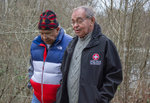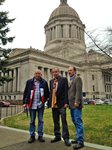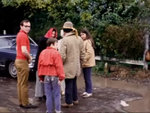



A soft-spoken man named Henry Lyle “Hank” Adams died last Monday, December 21 in Olympia at age 77.
Sitting with him, having a cigarette or a plate of fries, he might not tell you that his efforts helped change laws benefiting American Indians and Tribal rights around the United States.
Or that he helped to organized the largest protest gathering of Indians ever, and was the principal writer of the position documents supporting it. And then negotiated with President Richard M. Nixon to peaceably end that protest and another a year later.
Or that he was, for some 50 years, the closest advisor to the best-known Indian Treaty-rights activist of multiple recent generations, Billy Frank, Jr.
But he did. And he was.
Nearly everyone over the age of 12 in Olympia knows the name of Billy Frank, Jr. Some could tell you who Frank was or a little about the civil rights and legal efforts he lead. Many have compared him to Rev. Dr. Martin Luther King, Jr. in terms of his impact.
If Billy Frank, Jr. was the American Indian Martin Luther King, then Hank Adams was his Ralph Abernathy. Adams worked with both Abernathy and King as a member of the national steering committee of the Poor People’s Campaign in 1968.
“Every tribe in the United States owes a piece of gratitude towards Hank Adams,” according to Willie Frank III, 38, who has known Adams his entire life and says he considered him to be an uncle, although they were not related by blood or even tribal membership.
“One of the most amazing things about Hank is that he could remember dates, times and places of every treaty and event, like a sports fan might remember basketball highlights or baseball statistics. He was able to store that history in his head and bring it up when he needed it,” Frank III added.
Adams’ and Frank Jr.’s most enduring accomplishment was the negotiations that led in 1974 to what’s known as “The Boldt Decision” in United States v. Washington. This ended the Fish Wars and reaffirmed treaty rights dating back to 1854-56 to harvest half of the salmon and other fish “at all usual and accustomed grounds and stations.” The ruling also called for the tribes to co-manage these resources, along with Washington state.
Adams’ passing was announced last week by the Northwest Indian Fisheries Commission, an organization that was formed following the Boldt Decision. The announcement restated that “Adams … was called “the most important Indian” by author/historian Vine Deloria, Jr. … "Few achieved what he did to earn that high praise. An indispensable leader, and essential follower and a brilliant strategist, he shaped more Native American civil, human and treaty rights policies than most people even know are important or why.”
That’s not to say he operated only in the world of words and ideas. Like many Indian leaders in the 1960s and 70s he protested in person. Adams was beaten by police, arrested and hauled off to jail many times. In 1971 he was shot in the stomach; the assailant was never identified.
Adams was born May 16, 1943 in Wolf Point, Montana, a member of the Assiniboine and Sioux Tribes. His family moved to Longview, Washington, when he was a toddler, then on to other places in Washington and Oregon. His parents divorced during his grade-school years and his mother remarried, this time to a member of the Quinault Tribe and young Hank moved again, this time to Taholah, on Washington’s coast.
At nearby Moclips High School, Adams was “a standout athlete, a student body president and the editor of the school newspaper and annual,” according to his biography, Hank Adams: An Uncommon Life. After two years of study at the University of Washington, he dropped out the day that President John F. Kennedy was assassinated.
On his own, he continued to study and developed “such encyclopedic knowledge of Indian law he [was] often mistaken for an attorney,” including by Leonard Garment, President Nixon’s counsel, years later, according to Trova Heffernan, Adams’ biographer.
Speaking about their negotiations on both the 1972 protest takeover of the Bureau of Indian Affairs building and the Wounded Knee Occupation the following year, Garment was quoted as saying “Hank Adams' role in the peaceful resolution of some very difficult problems is still vividly clear in my mind."
“He understood how the power of celebrity could advance treaty fishing rights for Indians,” Heffernan wrote. Shortly after ending his college career to become a full-time activist, in 1964, he organized a major demonstration at the Washington State Capitol. He invited actor Marlon Brando and generated media attention from across the country.
“It’s crazy to think of the people Hank brought to Frank’s Landing so that they could witness the injustices that were happening here,” Willie Frank III remarked, listing “Brando, Dick Gregory, Jane Fonda … those were huge folks at that time in the ‘60s.”
In the late 1960s he had become a national leader in the larger civil rights movement, co-chairing the steering committee for Martin Luther King, Jr.’s Poor People’s Campaign. He marched hand in hand with King three days before his assassination. In 1968, he was picked to work as an aide to Robert F. Kennedy, but Kennedy, too was lost to assassination.
Later that year he ran unsuccessfully for the U.S. House of Representatives from Washington’s Third Congressional district; he tried again in 1972, both times as a Republican.
In 1968 Adams was named national director of the Survival of American Indians Association, with which had been involved for several years. As part of his work there he produced a one-hour documentary film titled, “As Long as the Rivers Run” that provided graphic evidence of the abuse of Indians taking place in Washington, particularly along the Nisqually River at Frank’s Landing.
In October 1972 Adams worked to unite hundreds of Indian Tribes and organizations by drafting the “Trail of Broken Treaties” document, also called “The 20 Points”, that was submitted to the White House the following month, after the Bureau of Indian Affairs protest was ended. Adams blamed the White House’s wholesale rejection of the document in January 1973 as a spark that led to the start of the Wounded Knee Occupation the following month, in which Indian activists took over the South Dakota town and held control there for 71 days.
Adams received many awards, including the Abraham Lincoln Award from the National Education Association in 1971, an Honorary Doctorate in Native Leadership from Northwest Indian College and the 2006 American Indian Visionary Award, presented by Indian Country Today at the National Press Club in Washington, DC.
For more information, see Obituary: Henry 'Hank' Lyle Adams in Indian Country Today, submitted by his family.